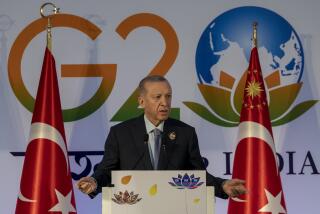The promise of Turkey
- Share via
Wouldn’t it be nice if Turkish Prime Minister Recep Tayyip Erdogan turned out to be a truly visionary leader of the 21st century? He heads a nation split between secularists and devout Muslims, a country that physically links Asia and Europe, and politically straddles East and West; Turkey is bound culturally to Europe and economically to neighboring Iran. Wouldn’t it be nice if Erdogan could prove himself the bridge across these epic divides?
At the urging of Erdogan’s moderate Islamist party, Turks this week voted by a large majority to reform their constitution, which was crafted in the aftermath of the 1980 military coup in an effort to institutionalize secular rule. Many of the reforms have been embraced by human rights groups because they will bring Turkey’s law into sync with European democratic standards, but they also have unnerved secularists because they give Erdogan’s government greater control over the military and courts, both of which have served as checks on Islamists’ power. With Erdogan seeking a third term next year, opponents fear a hidden agenda to consolidate Islamic rule and introduce Sharia law.
The reforms approved Sunday make important advances in the area of personal freedoms, liberalizing privacy and labor laws and strengthening gender equality, although they do not go far enough in protecting free speech and the rights of minority political parties. The most controversial measures concern making the military accountable to civilian courts, abolishing lifetime immunity for those who masterminded the coup and granting the government new powers to name judges, potentially compromising the country’s independent judiciary.
For decades, the military and secular governments repressed Islamic parties in an effort to maintain their grip on power. Now that Islamists are in control, their opponents fear not only the loss of power and all its perks, but retribution.
We understand the fear that Islamists may be cynically using the democratic process to impose an Islamic republic. But wouldn’t it be nice if those fears were unfounded? During two terms in power, Erdogan has not abandoned democracy, and he was not triumphalist after this vote. He says he wants to continue along the path to European Union membership. His country is a NATO member with noncombat troops aiding the U.S.-led war in Afghanistan, and Erdogan says he wants to serve as a facilitator between Iran and the United States. He says he wants continued relations with Israel — despite recent tensions over Israel’s offensive in the Gaza Strip and its assault on the Turkish aid flotilla bound for Gaza — as well as with Israel’s strategic enemy in Tehran.
Wouldn’t it be nice if Erdogan means what he says? Because he is uniquely positioned to make all the difference in the world.
More to Read
Sign up for Essential California
The most important California stories and recommendations in your inbox every morning.
You may occasionally receive promotional content from the Los Angeles Times.













